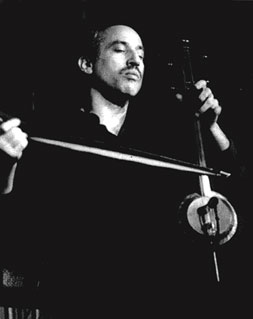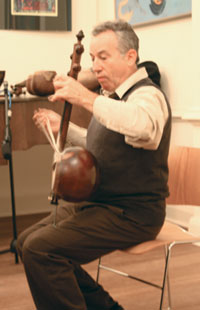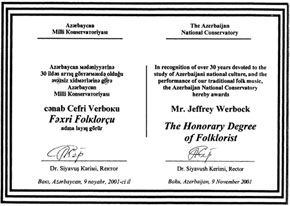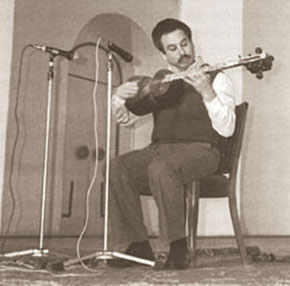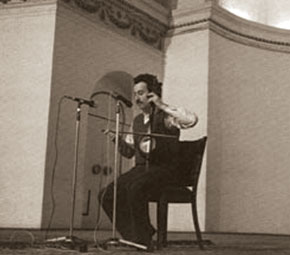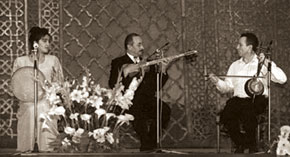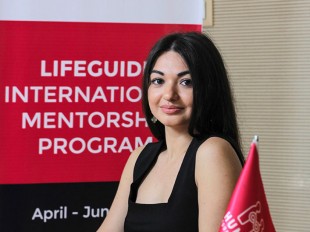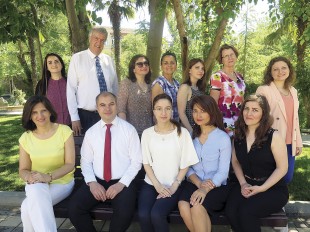Jeffrey Werbock: Mugham is "a source of inspiration for every form of music."
Pages 14-18
Jeffrey Werbock is a great friend of Azerbaijan, promoting Azerbaijani music worldwide. Many Azerbaijanis still remember the American who performed a duet of Deli Jeyran (Crazy Gazelle) with Zeynab Khanlarova, when he accompanied her on stage during Zeynab Khanum´s first American tour in 1988. Since then, Mr Werbock has increased his knowledge of Azerbaijan and its culture, even learning to speak the language. Today he is known as a skilful player of Azerbaijani national musical instruments, transcending his American origins. Visions magazine spoke to Mr Werbock about Azerbaijan and Azerbaijanis well as about Azerbaijani national music.
Pages 14-18
Jeffrey Werbock is a great friend of Azerbaijan, promoting Azerbaijani music worldwide. Many Azerbaijanis still remember the American who performed a duet of Deli Jeyran (Crazy Gazelle) with Zeynab Khanlarova, when he accompanied her on stage during Zeynab Khanum´s first American tour in 1988. Since then, Mr Werbock has increased his knowledge of Azerbaijan and its culture, even learning to speak the language. Today he is known as a skilful player of Azerbaijani national musical instruments, transcending his American origins. Visions magazine spoke to Mr Werbock about Azerbaijan and Azerbaijanis well as about Azerbaijani national music.
Mr Werbock, what do you remember of your first visit to Azerbaijan?
Azerbaijan was then still part of the Soviet Union, although at the time there was a palpable sense of hope for the future, and people spoke openly about independence, which was very exciting for me. It added a larger sense of world history to my own sense of personal history after finally arriving in the land of mugham, having dreamt for years about coming to Azerbaijan.
When I first arrived, I had no idea that virtually everyone in the country had seen me on television, specifically the programme Dalgha, a very popular show on AzTV, in which I sang the duet Deli Jeyran with Zeynab Khanum. So when people whom I met, even strangers on the streets, greeted me with such enthusiastic friendliness, sometimes spontaneously hugging me, I thought, these are the friendliest people on planet Earth! Only later did I learn why. Of course, Azerbaijanis in general have a very well developed sense of hospitality to visitors, but add to that the fact that I was an American who openly loved their great national music, mugham, you can imagine the effect their response had on me. Plus, I was deeply impressed with their obviously high level of education and cosmopolitan attitude. Frankly, I did not really know what to expect, but I suppose I must have had some subconscious thought that because of their geographical location that the peoples of the Caucasus would be somehow not as advanced as Europeans, but I was pleasantly surprised to find out that nearly everyone I met was quite sophisticated, in general much more than most Americans I knew, and together with the friendliness and the undercurrent of ancient Oriental culture, it should surprise no-one that I really fell in love with the people of Azerbaijan during that first trip.
What are the roots of your interest in Azerbaijani national music? Who was your first teacher?
I first read about Azerbaijan in 1971 from the autobiography of a mystic philosopher named George Gurdjieff who was born in the Caucasus and who was deeply impressed with the power of ashig (minstrel) music. I was 19 years old when I discovered Mr Gurdjieff and his incredible ideas and system of inner self development, and was amazed by the charismatic energy and intelligence of some of his original followers, so that anything he wrote, I received with great veneration. Since I was a composer of music, his mention of Azerbaijan and its great and ancient traditional music was particularly striking to me.
About one year later, the Whirling Dervishes of Konya made their first visit to America, and I went to see them perform in Los Angeles where I was living at that time. I was so impressed I went a second time, and paid particular attention to the music and singing, because it touched something unspeakably deep in me. I didn´t know that human beings had such inner depths and that there existed in the world special music which could reach those depths. About two months later I met an elderly man who was born in Derbend, Daghestan, named Zevulon Avshalomov, who played the kamancha. Really, there are no words to describe what I experienced when I first heard him play. It was as if I were pinned to the chair I was sitting on and could not move. I knew with utter certainty that everything I had achieved musically was merely a preparation for this moment, and that henceforth, I would follow the path of mugham.
Some musicians create a synthesis of Oriental and Western music and experiment in this sphere. What is your attitude to this?
Mugham has been and will continue to be a source of inspiration for every form of music, jazz and Western classical, being the two most common examples, but even blues and rock and roll have been improved greatly by the knowledge of mugham. It gives modern Azerbaijani musicians a great advantage to have mugham in their background. Although pure mugham is my preferred music to listen to, especially the instrumental mugham played on kamancha, tar, oud, balaban, and even on the modern Western saxophone and clarinet, those times when I have heard mugham fusion, I have enjoyed it. Not every example of this kind of fusion music is equally successful, of course, but some musicians will continue to try to use mugham to intensify their music and create something new for people.
You have established a mugham society in the US that promotes Azerbaijani culture. What does your activity comprise of?
Although I do play concerts, most of my work in this sphere is on the college lecture circuit. Mainly, I am invited to various colleges and universities, schools and institutes of higher learning, to lecture and demonstrate the music of Azerbaijan. I find that this format is much more successful in reaching the kind of people who can be helpful in the future, and that lecture demonstrations are much more effective in bringing people a positive sense of Azerbaijan that they are more likely to keep with them in the future.Usually the presentations take place in a classroom or lecture hall, and I write the words Azerbaijan and Mugham on the blackboard, along with the names of the instruments and their technical designation (e.g. the kamancha is a skin-faced spike fiddle played with a horsehair bow) and list the important features and characteristics of mugham.
Then I will play for the students a short passage from some mugham, repeat it several times until they get the feeling of it, to the point that they can actually anticipate the notes, almost like a short lesson, then I go on to show them the improvisational possibilities of mugham, and even more importantly, demonstrate the incredible mental state changing power of mugham. Of course, not everyone who hears mugham will experience exactly what I intend, but in all the many years I have played at hundreds and hundreds of places where non-Azeri people were in the audience, many if not most felt the power of mugham to transform their consciousness and transport them to another realm. I only wish that all Azerbaijanis could see the faces and hear the remarks of my listeners. Perhaps someday I will make a documentary about this phenomenon.
Could you tell us about your future plans?
I plan to continue to make these presentations as often as possible. Right now, I am scheduled to make presentations at the Boston Museum of Fine Arts, Dartmouth College in Hanover New Hampshire, and several other institutes of higher learning. I have an ongoing arrangement with a professor of ethnomusicology at Temple University in Philadelphia, where I recently gave numerous presentations to many students taking courses in World Music, and a concert as well, connections to the University of Pennsylvania, and Fletchers School of International Relations, a part of Tufts University. Also, I am in touch with professors at both Harvard and Yale who have expressed strong interest in bringing my programme to their great universities. One of my most interesting ongoing connections is with the United States Department of State at their Foreign Services Training Center in Arlington VA. I have been there many times as a guest lecturer and music performer, and I hope to continue to be of service in that capacity.
Most people who know me realize that I have a profession as a product design engineer specializing in architectural lighting equipment to illuminate the interiors and exteriors of buildings, and otherwise lead a relatively normal middle-class American life. I do these presentations of Azerbaijani mugham as a side activity, so far generously tolerated by the CEO of the company I work for. Perhaps some day in the future, while I still have the energy to drive long distances and get on airplanes, etc., I will be able to spend more time promoting Azerbaijan and its excellent traditional art culture, and help to make mugham more widely known and respected throughout the English-speaking world, so that Azerbaijan can finally take its rightful place among the great countries and cultures of the world.
